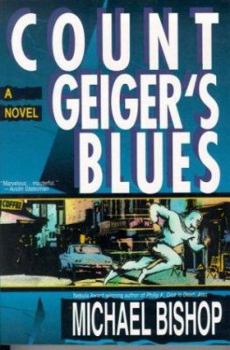Count Geiger's Blues
Select Format
Select Condition 
Book Overview
Critic Xavier Thaxton detests popular culture. But when a wildly improbable plunge into a pool of toxic waste gives him an allergy to High Art and transforms him into (of all things) a costumed... This description may be from another edition of this product.
Format:Paperback
Language:English
ISBN:0312890087
ISBN13:9780312890087
Release Date:January 1994
Publisher:Orb Books
Length:374 Pages
Weight:1.00 lbs.
Dimensions:1.0" x 5.5" x 8.2"
Customer Reviews
3 ratings
almost too good
Published by Thriftbooks.com User , 19 years ago
Over the course of his career, Michael Bishop has turned out a series of solid, memorable novels, one after another, many among the very best works sf has to offer. Though always amusing and stylish, Bishop's novels, perhaps as a result of their bittersweet story lines and dependence on strong character development, have failed to catch on with a larger audience. Count Geiger's Blues offers, at first glance, anything but what we've become accustomed to in Bishop's work, tackling, of all things, the world of superhero comic books. Count Geiger's Blues, however, bears closer resemblance to Alan Moore and Dave Gribbons' innovative Watchmen series than to superman. In the end, this spoof and loving embrace of the superhero genre proves too well written, too intellectual, and too sensitive to its characters to grant Bishop the audience that has eluded him for so long.
Enemies of decency (and good comic books) beware
Published by Thriftbooks.com User , 20 years ago
As an author, Michael Bishop is hard to classify. His novels manage to attain that nebulous position between SF and fantasy, maintaining enough realism for the reader to truly believe that his novels could happen in the "real world". Most of the time his novels function on more than one level, telling both the story and conveying another layer of meaning above that . . . "Brittle Innings" was both a poignant look back at the golden days of baseball and a comment on what truly makes a monster. In this book, things are a little farther out, but not by much. In a fictional town, Xavier Thaxton writes for the Fine Arts section of the local newspaper. His disdain for popular culture is unmatched and he takes every opportunity he can to slam "low" art and elevate the fine arts, opera and classical music and nice paintings and what not. Then one day a bunch of things happen to him at once. His nephew, a "retro-punk" whose hatred for fine art equals his uncle's dislike of pop culture, comes to live with him . . . and Xavier takes a dip in water tainted by radioactivity and finds that he can no longer stand the presence of fine art without being exposed to an equal amount of pop culture. Eventually he finds that events are steering him to become that perfect embodiment of pop culture . . . the superhero. Bishop wonderfully deconstructs the superhero concept, from his weird origin (with a perfectly realistic eventual outcome) to taking the idea of "doing good" to absurd extremes, as Xavier tries to get bars to show seminars on how to respect women, and in fact there's very little superheroesque action involved in the story itself so those purely interested in strangely dressed people beating each other up should go to their local store and find an Image comic (or watch wrestling, I guess). Those wanted dense, rapid storytelling should look elsewhere too, or at least discover new reserves of patience . . . in comics there's a term called "decompressed storytelling" and that certainly applies here, Bishop takes his sweet time developing all of this and the concept of Xavier as superhero doesn't even appear until the book is half over. This isn't a bad thing but there are points where you're wondering where this is all going. The general tone of the book is satire and lightheartedness, definitely not in the "grim and gritty" Dark Knight Returns/Watchmen style of comics, although Bishop knows how to contrast utterly real moments (like the fate of everyone else who gets exposed to the radiation) and he manages to ground the book in a tangible sense of reality and not make it seem like some weird cartoon. Not all the characters really come across as three-dimensional, Xavier is really the only person to truly feel real, his girlfriend Bari is fun but never really comes alive and while his nephew "the Mick" has his moments, his annoying line of supercool hipper-than-thou speak reminds me of old Justice League comics with Snapper Carr. Which is prob
Tells a good story while poking fun at art, journalism, etc.
Published by Thriftbooks.com User , 28 years ago
Bishop takes a cast of highly improbably characters who are suspiciously like people you know and tells a wonderfully entertaining and human story about the nature of heroism and duty. Along the way he skewers art, art critics, comic books, journalism, rock/alternative music, teenage angst, and almost anything else that wanders by. It's damned hard to write a satire without turning the characters into caricatures, but Bishop keeps all his people three-dimensional and (mostly) likeable even at their worst. I'm most impressed with what Bishop does with Geiger himself. Geiger starts as a character rich in artistic depth but one- dimensional as a person. He ends up as a one-dimensional comic book character who's much deeper as a person. An impressive inversion, and an impressive work to pull off.






